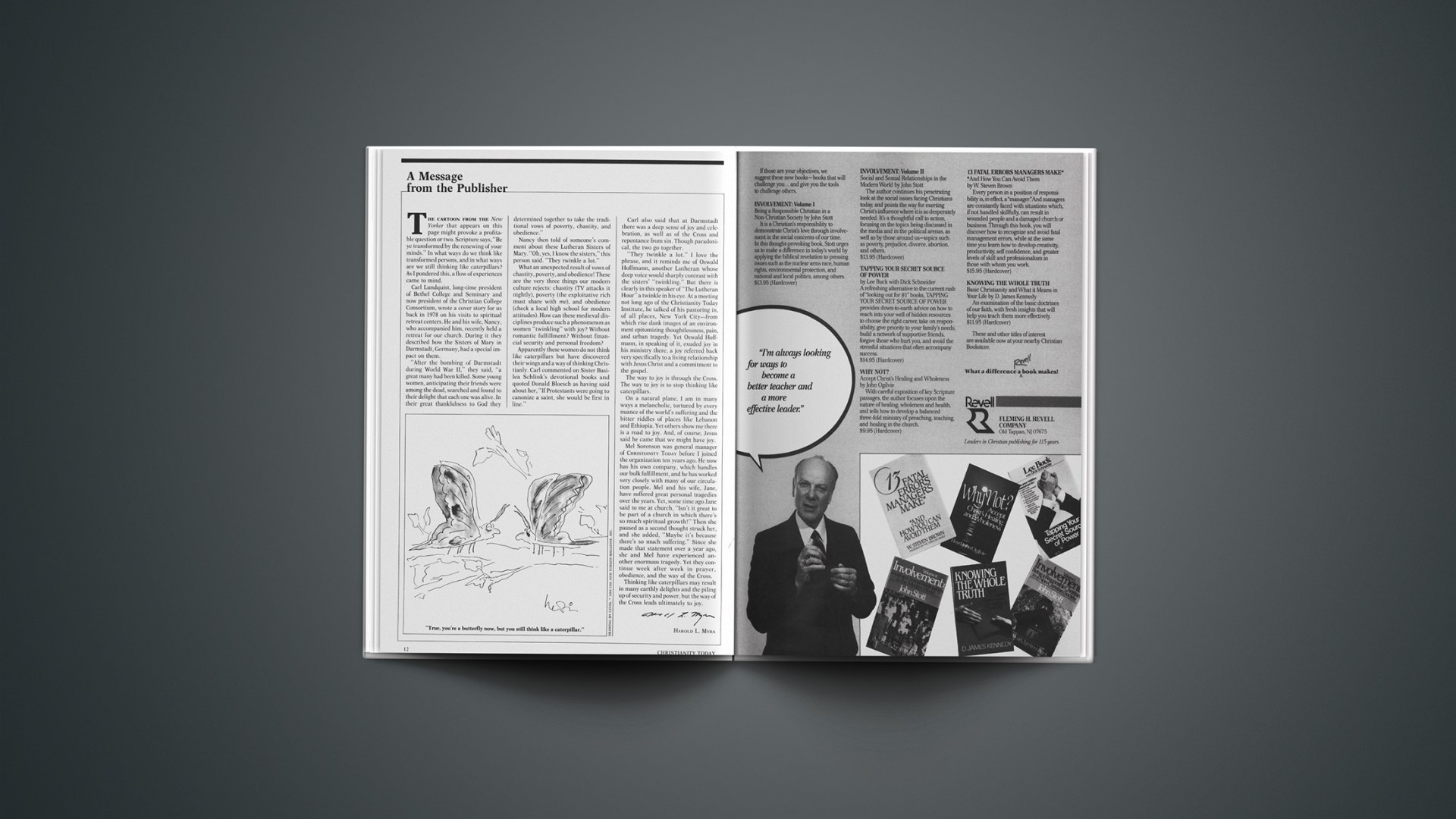The cartoon from the New Yorker that appears on this page might provoke a profitable question or two. Scripture says, “Be ye transformed by the renewing of your minds.” In what ways do we think like transformed persons, and in what ways are we still thinking like caterpillars? As I pondered this, a flow of experiences came to mind.
Carl Lundquist, long-time president of Bethel College and Seminary and now president of the Christian College Consortium, wrote a cover story for us back in 1978 on his visits to spiritual retreat centers. He and his wife, Nancy, who accompanied him, recently held a retreat for our church. During it they described how the Sisters of Mary in Darmstadt, Germany, had a special impact on them.
“After the bombing of Darmstadt during World War II,” they said, “a great many had been killed. Some young women, anticipating their friends were among the dead, searched and found to their delight that each one was alive. In their great thankfulness to God they determined together to take the traditional vows of poverty, chastity, and obedience.”
Nancy then told of someone’s comment about these Lutheran Sisters of Mary. “Oh, yes, I know the sisters,” this person said. “They twinkle a lot.”
What an unexpected result of vows of chastity, poverty, and obedience! These are the very three things our modern culture rejects: chastity (TV attacks it nightly), poverty (the exploitative rich must share with me), and obedience (check a local high school for modern attitudes). How can these medieval disciplines produce such a phenomenon as women “twinkling” with joy? Without romantic fulfillment? Without financial security and personal freedom?
Apparently these women do not think like caterpillars but have discovered their wings and a way of thinking Christianly. Carl commented on Sister Basilea Schlink’s devotional books and quoted Donald Bloesch as having said about her, “If Protestants were going to canonize a saint, she would be first in line.”
Carl also said that at Darmstadt there was a deep sense of joy and celebration, as well as of the Cross and repentance from sin. Though paradoxical, the two go together.
“They twinkle a lot.” I love the phrase, and it reminds me of Oswald Hoffmann, another Lutheran whose deep voice would sharply contrast with the sisters’ “twinkling.” But there is clearly in this speaker of “The Lutheran Hour” a twinkle in his eye. At a meeting not long ago of the Christianity Today Institute, he talked of his pastoring in, of all places, New York City—from which rise dank images of an environment epitomizing thoughtlessness, pain, and urban tragedy. Yet Oswald Hoffmann, in speaking of it, exuded joy in his ministry there, a joy referred back very specifically to a living relationship with Jesus Christ and a commitment to the gospel.
The way to joy is through the Cross. The way to joy is to stop thinking like caterpillars.
On a natural plane, I am in many ways a melancholic, tortured by every nuance of the world’s suffering and the bitter riddles of places like Lebanon and Ethiopia. Yet others show me there is a road to joy. And, of course, Jesus said he came that we might have joy.
Mel Sorenson was general manager of CHRISTIANITY TODAY before I joined the organization ten years ago. He now has his own company, which handles our bulk fulfillment, and he has worked very closely with many of our circulation people. Mel and his wife, Jane, have suffered great personal tragedies over the years. Yet, some time ago Jane said to me at church, “Isn’t it great to be part of a church in which there’s so much spiritual growth!” Then she paused as a second thought struck her, and she added, “Maybe it’s because there’s so much suffering.” Since she made that statement over a year ago, she and Mel have experienced another enormous tragedy. Yet they continue week after week in prayer, obedience, and the way of the Cross.
Thinking like caterpillars may result in many earthly delights and the piling up of security and power, but the way of the Cross leads ultimately to joy.










